- Home
- Diana Wynne Jones
Caribbean Cruising Page 11
Caribbean Cruising Read online
Page 11
Mary held the tray out. Mr. Saunders took Euphemia and put her on the schoolroom table. Euphemia croaked agitatedly. “Only a minute now,” Mr. Saunders said soothingly. He held his hands cupped around her. Nothing happened. Looking a little puzzled, Mr. Saunders began to mutter things. Still nothing happened. Euphemia’s head bobbed anxiously above his bony fingers, and she was still a frog. Mr. Saunders went from looking puzzled to looking baffled. “This is a very strange spell,” he said. “What did you use, Eric?”
“I can’t remember,” said Cat.
“Well, it doesn’t respond to anything I can do,” said Mr. Saunders. “You’ll have to do it, Eric. Come over here.”
Cat looked helplessly at Chrestomanci, but Chrestomanci nodded as if he thought Mr. Saunders was quite right. Cat stood up. His legs had gone thick and weak, and his stomach seemed to have taken up permanent quarters in the Castle cellars. He slunk towards the table. When Euphemia saw him coming, she showed her opinion of the matter by taking a frantic leap off the edge of the table. Mr. Saunders caught her in midair and put her back.
“What do I do?” Cat said, and his voice sounded like Euphemia croaking.
Mr. Saunders took Cat by his left wrist and planted Cat’s left hand on Euphemia’s clammy back. “Now take it off her,” he said.
“I—I—” said Cat. He supposed he ought to pretend to try. “Stop being a frog and turn into Euphemia again,” he said, and wondered miserably what they would do to him when Euphemia didn’t.
But, to his astonishment, Euphemia did. The frog turned warm under his fingers and burst into growth. Cat shot a look at Mr. Saunders as the brown lump grew furiously larger and larger. He was almost sure he caught a secret smile on Mr. Saunders’ face. The next second, Euphemia was sitting on the edge of the table. Her clothes were a little crumpled and brown, but there was nothing else froggish about her. “I never dreamed it was you!” she said to Cat. Then she put her face in her hands and cried.
Chrestomanci came up and put his arm around her. “There, there, my dear. It must have been a terrible experience. I think you need to go and lie down.” And he took Euphemia out of the room.
“Phew!” said Janet.
Mary grimly handed out the milk and biscuits. Cat did not want his. His stomach had not yet come back from the cellars. Janet refused biscuits.
“I think the food here is awfully fattening,” she said unwisely. Julia took that as a personal insult. Her handkerchief came out and was knotted. Janet’s glass of milk slipped through her fingers and smashed on the pitted floor.
“Clean it up,” said Mr. Saunders. “Then get out, you and Eric. I’ve had enough of both of you. Julia and Roger, get out magic textbooks, please.”
Cat took Janet out into the gardens. It seemed safest there. They wandered across the lawn, both rather limp after the morning’s experiences.
“Cat,” said Janet, “you’re going to be very annoyed with me, but it’s absolutely essential that I cling to you like a limpet all the time we’re awake, until I know how to behave. You saved my bacon twice this morning. I thought I was going to die when she brought in that frog. Rigor mortis was setting in, and then you turned her back again! I didn’t realize you were a witch too—no, it’s a warlock, isn’t it? Or are you a wizard?”
“I’m not,” said Cat. “I’m not any of those things. Mr. Saunders did it to give me a fright.”
“But Julia is a witch, isn’t she?” said the shrewd Janet. “What have I done to make her hate me so—or is it just general Gwendolenitis?”
Cat explained about the snakes.
“In which case I don’t blame her,” said Janet. “But it’s hard that she’s in the schoolroom at the moment brushing up her witchcraft, and here I am without a rag of a spell to defend myself with. You don’t know of a handy karate teacher, do you?”
“I never heard of one,” Cat said cautiously, wondering what karate might be.
“Oh well,” said Janet. “Chrestomanci’s a wonderfully fancy dresser, isn’t he?”
Cat laughed. “Wait till you see him in a dressing gown!”
“I hardly can. It must be something! Why is he so terrifying?”
“He just is,” said Cat.
“Yes,” said Janet. “He just is. When he saw the frog was Euphemia and went all mild and astonished like that, it froze the goose pimples on my back. I couldn’t have told him I wasn’t Gwendolen—not even under the most refined modern tortures—and that’s why I shall have to stick to you. Do you mind terribly?”
“Not at all,” said Cat. But he did rather. Janet could not have been more of a burden if she had been sitting on his shoulders with her legs wrapped around his chest. And to crown it all, it seemed as if there had been no need for his false confession. He took Janet to the ruins of the tree house because he wanted something else to think about. Janet was enchanted with it. She swung herself up into the horse chestnut to look at it, and Cat felt rather as you do when someone else gets into your railway carriage. “Be careful,” he called crossly.
There was a strong rending noise up in the tree. “Drat!” said Janet. “These are ridiculous clothes for climbing trees in.”
“Can’t you sew?” Cat called as he climbed up too.
“I despise it as female bondage,” said Janet. “Yes, I can, actually. And I’m going to have to. It was both petticoats.” She tested the creaking floor that was all that remained of the house and stood up on it, trailing two different colors of frill below the hem of Gwendolen’s dress. “You can see into the village from here. There’s a butcher’s cart just turning in to the Castle drive.”
Cat climbed up beside her and they watched the cart and the dappled horse pulling it.
“Don’t you have cars at all?” Janet asked. “Everyone has cars in my world.”
“Rich people do,” said Cat. “Chrestomanci sent his to meet us off the train.”
“And you have electric light,” said Janet. “But everything else is old-fashioned compared with my world. I suppose people can get what they want by witchcraft. Do you have factories, or long-playing records, or high-rise buildings, or television, or airplanes at all?”
“I don’t know what airplanes are,” said Cat. He had no idea what most of the other things were either, and he was bored with this talk.
Janet saw he was. She looked around for a change of subject and saw clusters of big green horse chestnut cases hanging all around them at the ends of the branches. The leaves there were already singed-looking around the edges, suggesting that the chestnuts could not be far off ripe. Janet edged out along a branch and tried to reach the nearest cluster of green cases. They bobbed at the tips of her fingers, just out of reach. “Oh, dachshunds!” she said. “They look almost ripe.”
“They aren’t,” said Cat. “But I wish they were.” He took a lathe out of the wreckage of the house and slashed at the chestnut cases with it. He missed, but he must have shaken them. Eight or so dropped off the tree and went plomp on the ground below.
“Who says they’re not ripe?” said Janet, leaning down.
Cat craned out of the tree and saw brown shiny chestnuts showing in the split green cases. “Oh, hurray!” He came down the tree like a monkey, and Janet crashed after him, with her hair full of twigs. They scooped up the chestnuts greedily—wonderful chestnuts with grain on them like the contours in a map.
“A skewer!” Janet moaned. “My kingdom for a skewer! We can thread them on my bootlaces.”
“Here’s a skewer,” said Cat. There was one lying on the ground by his left hand. It must have fallen out of the tree house.
They drilled chestnuts furiously. They took the laces out of Gwendolen’s second-best boots. They discovered the rules of the game were the same in both their worlds, and they went to the formal garden and held a battle royal there on the gravel path. As Janet firmly smashed Cat’s last chestnut and yelled, “Mine! Mine’s a sevener now!”
Millie came around a corner past a yew tree and stood laughing at them.
“Do you know, I wouldn’t have thought the chestnuts were ripe yet. But it’s been a lovely summer.”
Janet looked at her in consternation. She had no idea who this plump lady in the beautiful flowered silk dress could be.
“Hallo, Millie,” said Cat. Not that this helped Janet much.
Millie smiled and opened the handbag she was carrying. “There are three things Gwendolen needs, I think. Here.” She handed Janet two safety pins and a packet of bootlaces. “I always believe in being prepared.”
“Th-thanks,” Janet stammered. She was horribly conscious of her gaping boots, her twig-filled hair, and the two trailing strips of petticoat. She was even more confused by not knowing who Millie was.
Cat knew that. He knew by now that Janet was one of those people who are not happy unless they have an explanation for everything. So he said fulsomely to Millie, “I do think Roger and Julia are lucky, having a mother like you, Millie.”
Millie beamed and Janet looked enlightened. Cat felt dishonest. He did think that, but he would never have dreamed of saying it but for Janet.
Having gathered that Millie was Chrestomanci’s wife, Janet was quite unable to resist going on and gathering as much more information as she could. “Millie,” she said, “were Cat’s parents first cousins like—I mean, were they? And what relation is Cat to you?”
“That sounds like those questions they ask you to find out how clever you are,” said Millie. “And I don’t know the answer, Gwendolen. It’s my husband’s family you’re related to, you see, and I don’t know too much about them. We need Chrestomanci here to explain, really.”
As it happened, Chrestomanci came through the doorway in the garden wall at that moment. Millie rustled up to him, beaming.
“My love, we were needing you.”
Janet, who had her head down, trying to pin her petticoats, glanced up at Chrestomanci and then looked thoughtfully down at the path, as if the stones and sand there had suddenly become rather interesting.
“It’s quite simple,” Chrestomanci said, when Millie had explained the question. “Frank and Caroline Chant were my cousins—and first cousins to one another too, of course. When they insisted on getting married, my family made a great fuss, and my uncles cut them off without a shilling in a thoroughly old-fashioned way. It is, you see, rather a bad thing for cousins to marry when there’s witchcraft in the family. Not that cutting them off made the slightest difference, of course.” He smiled at Cat. He seemed thoroughly friendly. “Does that answer the question?”
Cat had an inkling of how Gwendolen had felt. It was confusing and exasperating the way Chrestomanci would seem friendly when one ought to have been in disgrace. He could not resist asking, “Is Euphemia all right?”
Then he wished he had not asked. Chrestomanci’s smile snapped off like a light. “Yes. She’s feeling better now. You show touching concern, Eric. I believe you were so sorry for her that you hid her in a wardrobe?”
“My love, don’t be so terrifying,” Millie said, hooking her arm through Chrestomanci’s. “It was an accident, and it’s all over now.” She led him away down the path. But, just before they went out of sight behind a yew tree, Chrestomanci turned and looked over his shoulder at Cat and Janet. It was his bewildered look, but it was far from reassuring.
“Hot-cross bun-wrappers! Jiminy purple creepers!” Janet whispered. “I’m beginning to hardly dare move in this place!” She finished pinning her petticoat. When Millie and Chrestomanci had had nearly a minute in which to walk out of hearing, she said, “She’s sweet—Millie—an absolute honey. But him! Cat, is it possible Chrestomanci is a rather powerful enchanter?”
“I don’t think he is,” said Cat. “Why?”
“Well,” said Janet, “partly it’s the feeling he gives—”
“I don’t get a feeling,” said Cat. “I’m just frightened of him.”
“That’s it,” said Janet. “You’re probably muddled anyhow from having lived with witches all your life. But it isn’t only a feeling. Have you noticed how he always comes when people call him? He’s done it twice now.”
“Those were two complete accidents,” said Cat. “You can’t build ideas on accidents.”
“He disguises it quite well, I admit,” said Janet. “He comes looking as if it was something else he was doing, but—”
“Oh, do shut up! You’re getting as bad as Gwendolen. She couldn’t stop thinking of him for a moment,” Cat said crossly.
Janet pounded her open right boot on the gravel. “I am not Gwendolen! I’m not even really like her! Get that into your fat head, will you!”
Cat started to laugh.
“Why are you laughing?” said Janet.
“Gwendolen always stamps when she’s angry too,” said Cat.
“Gah!” said Janet.
11
B Y THE TIME Janet had laced both her boots, Cat was sure it was lunchtime. He hurried Janet back to the private door. They had nearly reached it when a thick voice spoke among the rhododendrons.
“Young lady! Here a minute!”
Janet gave Cat an alarmed look and they both hurried for the door. It was not a pleasant voice. The rhododendrons clashed and rustled indignantly beside them. A fat old man in a dirty raincoat spilled out of them. Before they had recovered from the surprise of seeing him, he had scuttled around between them and the door, where he stood looking at them reproachfully out of drooping red eyes and breathing beer-scented breath over them.
“Hallo, Mr. Baslam,” Cat said, for Janet’s benefit.
“Didn’t you hear me, young lady?” Mr. Baslam demanded.
Cat could see Janet was frightened of him, but she answered as coolly as Gwendolen might have done. “Yes, but I thought it was the tree speaking.”
“The tree speaking!” said Mr. Baslam. “After all the trouble I been to for you, you take me for a tree! Three whole pints of bitter I had to buy that butcher to have him bring me in that cart of his, and I’m fair jolted to bits!”
“What do you want?” Janet said nervously.
It’s like this,” said Mr. Baslam. He pulled aside his raincoat and searched slowly in the pockets of his loopy trousers.
“We have to go in for lunch,” said Cat.
“All in good time, young gentleman. Here we are,” said Mr. Baslam. He held his pale, grubby hand out towards Janet with two twinkling things in it. “These.”
“Those are my mother’s earrings!” Cat said, in surprise and for Janet’s benefit. “How did you get those?”
“Your sister give them to me to pay for a little matter of some dragons’ blood,” said Mr. Baslam. “And I dare say it was in good faith, young lady, but they’re no good to me.”
“Why not?” asked Janet. “They look like—I mean, they’re real diamonds.”
“True enough,” said Mr. Baslam. “But you never told me they was charmed, did you? They got a fearsome strong spell on them to stop them getting lost, these have. Terrible noisy spell. They was all night in the stuffed rabbit shouting out ‘I belong to Caroline Chant,’ and this morning I has to wrap them in a blanket before I dares take them to a man I know. And he wouldn’t touch them. He said he wasn’t going to risk anything shouting the name of Chant. So have them back, young lady. And you owe me fifty-five quid.”
Janet swallowed. So did Cat. “I’m very sorry,” Janet said. “I really had no idea. But—but I’m afraid I haven’t any source of income at all. Couldn’t you get the charm taken off?”
“And risk inquiries?” said Mr. Baslam. “That charm’s deep in, I tell you.”
“Then why aren’t they shouting now?” said Cat.
“What do you think I am?” said Mr. Baslam. “Could I sit in the joints of mutton shouting out I belonged to Miss Chant? No. This man I know obliges me with a bit of a spell on account. But he s
ays to me, he says, ‘I can’t only shut them up for an hour or so. That’s a real strong charm. If you want it took off permanent, you’d have to take them to an enchanter. And that would cost you as much as the earrings are worth, besides getting questions asked.’ Enchanters are important people, young lady. So here I sits in them bushes, scared to death the spell’s going to wear off before you comes by, and now you say you’ve no income! No—you have them back, young lady, and hand over a little something on account instead.”
Janet looked nervously at Cat. Cat sighed and felt in his pockets. All he had was half a crown. He offered it to Mr. Baslam.
Mr. Baslam backed away from it with a hurt, drooping look, like a whipped St. Bernard. “Fifty-five quid I ask for, and you offer me half a crown! Son, are you having a joke on me?”
“It’s all either of us has got,” said Cat, “at the moment. But we each get a crown piece every week. If we give you that, we’ll have paid you back in—” He did hurried calculations. Ten shillings a week, fifty-two weeks in a year, twenty-six pounds a year. “It’ll only take two years.” Two years was an appalling time to be without money. Still, Mr. Baslam had got Gwendolen her dragons’ blood, and it seemed fair that he should be paid.
But Mr. Baslam looked more hurt than ever. He turned away from Cat and Janet and gazed mournfully up at the Castle walls. “You live in a place like this, and tell me you can only get hold of ten bob a week! Don’t play cruel games with me. You can lay your hands on no end of lucre if you puts your minds to it.”
“But we can’t, honestly,” Cat protested.
“I think you should try, young gentleman,” said Mr. Baslam. “I’m not unreasonable. All I’m asking is twenty quid part payment, interest of ten percent included, and the price of the shutting-up spell thrown in. That should come quite easy to you.”
“You know perfectly well it won’t!” Janet said indignantly. “You’d better keep those earrings. Your stuffed rabbit may look pretty in them.”

 Fire and Hemlock
Fire and Hemlock Reflections: On the Magic of Writing
Reflections: On the Magic of Writing The Game
The Game The Crown of Dalemark
The Crown of Dalemark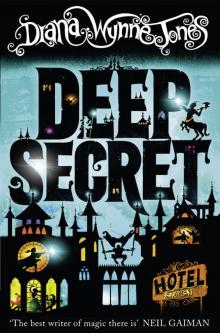 Deep Secret
Deep Secret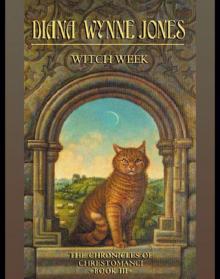 Witch Week
Witch Week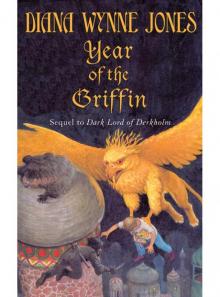 Year of the Griffin
Year of the Griffin Wild Robert
Wild Robert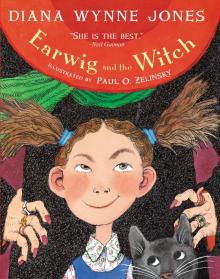 Earwig and the Witch
Earwig and the Witch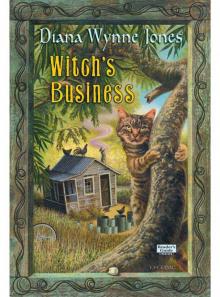 Witch's Business
Witch's Business Dogsbody
Dogsbody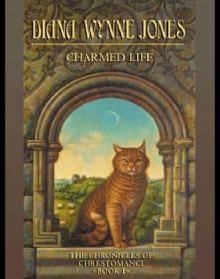 Caribbean Cruising
Caribbean Cruising Cart and Cwidder
Cart and Cwidder Conrad's Fate
Conrad's Fate Howl's Moving Castle
Howl's Moving Castle The Spellcoats
The Spellcoats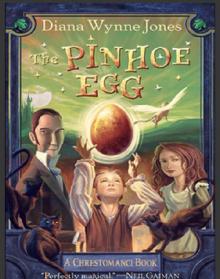 The Pinhoe Egg
The Pinhoe Egg Drowned Ammet
Drowned Ammet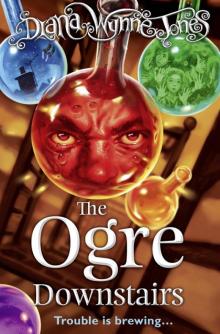 The Ogre Downstairs
The Ogre Downstairs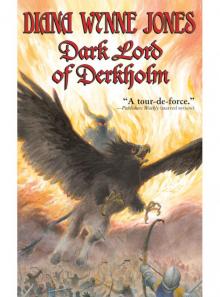 Dark Lord of Derkholm
Dark Lord of Derkholm Castle in the Air
Castle in the Air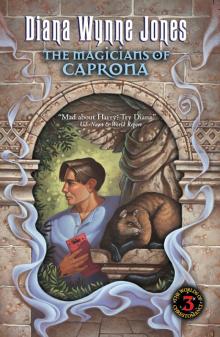 The Magicians of Caprona
The Magicians of Caprona A Tale of Time City
A Tale of Time City The Lives of Christopher Chant
The Lives of Christopher Chant The Magicians of Caprona (UK)
The Magicians of Caprona (UK)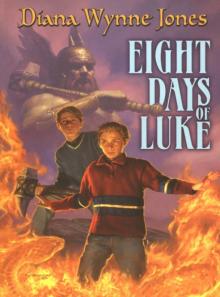 Eight Days of Luke
Eight Days of Luke Conrad's Fate (UK)
Conrad's Fate (UK)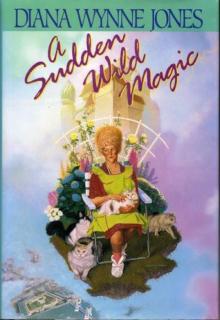 A Sudden Wild Magic
A Sudden Wild Magic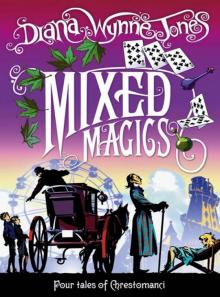 Mixed Magics (UK)
Mixed Magics (UK)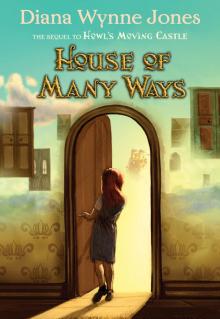 House of Many Ways
House of Many Ways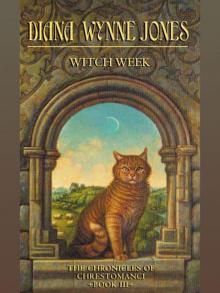 Witch Week (UK)
Witch Week (UK) The Homeward Bounders
The Homeward Bounders The Merlin Conspiracy
The Merlin Conspiracy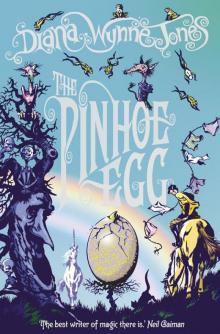 The Pinhoe Egg (UK)
The Pinhoe Egg (UK)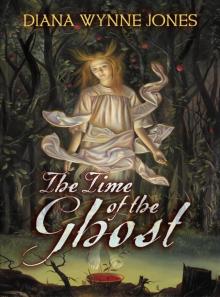 The Time of the Ghost
The Time of the Ghost Hexwood
Hexwood Enchanted Glass
Enchanted Glass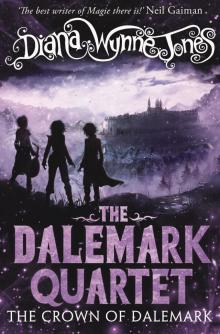 The Crown of Dalemark (UK)
The Crown of Dalemark (UK)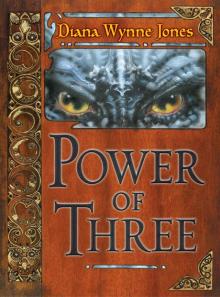 Power of Three
Power of Three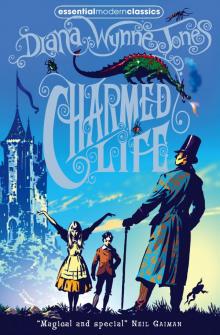 Charmed Life (UK)
Charmed Life (UK)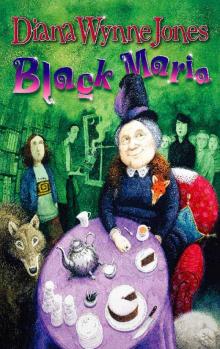 Black Maria
Black Maria The Islands of Chaldea
The Islands of Chaldea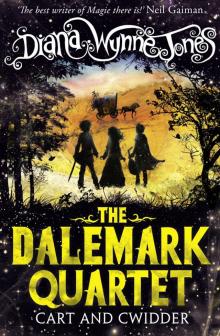 Cart and Cwidder (UK)
Cart and Cwidder (UK)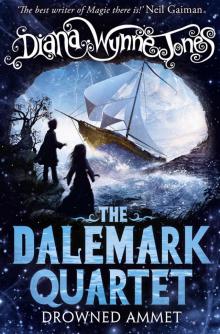 Drowned Ammet (UK)
Drowned Ammet (UK)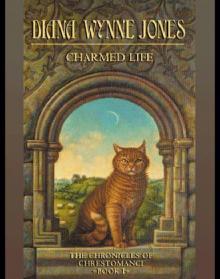 Charmed Life
Charmed Life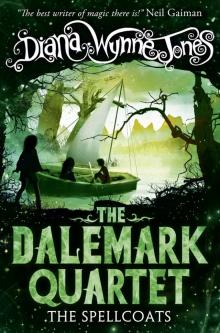 The Spellcoats (UK)
The Spellcoats (UK)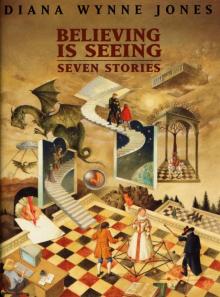 Believing Is Seeing
Believing Is Seeing Samantha's Diary
Samantha's Diary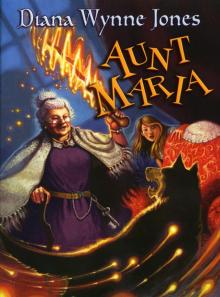 Aunt Maria
Aunt Maria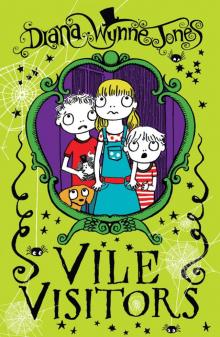 Vile Visitors
Vile Visitors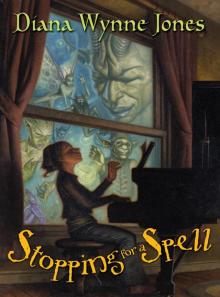 Stopping for a Spell
Stopping for a Spell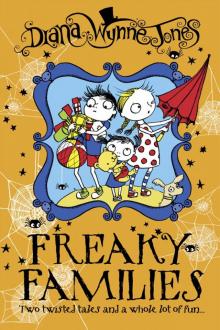 Freaky Families
Freaky Families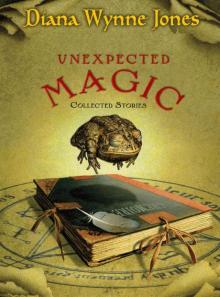 Unexpected Magic
Unexpected Magic Reflections
Reflections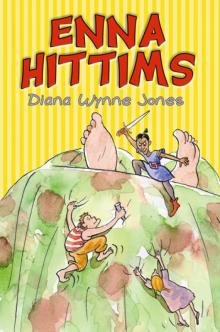 Enna Hittms
Enna Hittms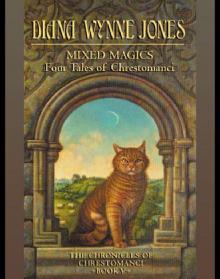 Mixed Magics: Four Tales of Chrestomanci
Mixed Magics: Four Tales of Chrestomanci